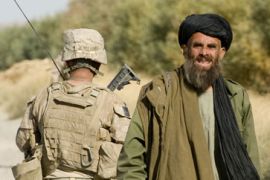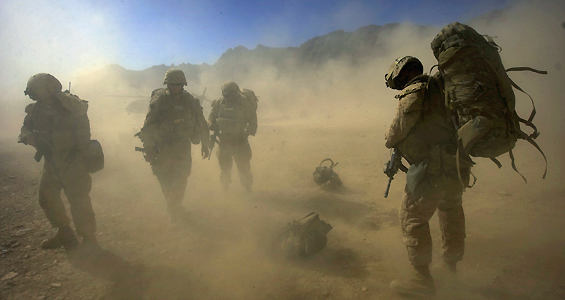Interview: Obama’s Afghan strategy
Al Jazeera’s senior political analyst says Obama escalates the war, but limits its objectives.

 |
| The new deployment of 30,000 soldiers will bring US troop numbers to more than 100,000 [AFP] |
Unveiling his plans for turning around the eight-year long war in Afghanistan and paving the way for a US pullout, Barack Obama has announced that the US is to deploy an extra 30,000 troops.
In a speech at the US military academy at West Point on Tuesday, the US president set out what he said was a new strategy to bring the war to a “successful conclusion” and reverse the momentum of Taliban gains.
Marwan Bishara, Al Jazeera’s senior political analyst, analyses Obama’s address to the nation.
Al Jazeera: We very much expected much of what Obama said – but has anything changed in the speech that would make Americans think this war can be won?
Marwan Bishara: No, nothing new was laid out on the way to victory. Rather, Obama underlined how his war strategy of escalation is the best of bad options to deal with a national security threat that was imposed on America by al-Qaeda and the Taliban and for eight years was mishandled by the Bush administration.
What’s the thinking behind telling the Taliban the exact timetable of when US troops will pull out? Doesn’t that just embolden the Taliban – or is he trying to appease his critics?
This is a claim made by President Obama’s detractors on the right who prefer an open-ended military campaign in Afghanistan. It is only partially true that such a move would calm the critics in the Democratic party and the peace camp that has strongly supported Obama.
| In depth |
|
Videos: |
In a sense it does send a sign to the undecided among the Afghanis that the US will leave sooner than later and hence should hedge their bets on the local power.
However, on the other hand it puts much needed pressure on the generals as well as local and international allies to get their act together and use a rather limited window of opportunity to achieve real success, and in doing so ensure the war doesn’t drag on aimlessly or endlessly.
Why does the American strategy concentrate on trying to control the cities and major population centres? Does that just push the Taliban out to the country areas – but not actually eradicate the threat?
That’s how it needs to be fought anyway because the idea is not only to protect the population, as the Americans would like to say, but make sure the population and its leaders understand that the US will try and protect them if they collaborate with it, and the Taliban will never be able to protect them if they don’t work with America.
Many Americans and Europeans have expressed their distaste for the war – so why does the US continue to believe that military power is the only way to solve faraway security problems?
America has long acted as an empire that acts according to international power politics rather than a republic.
For decades, the US “military industrial complex” – as president Eisenhower described the conversion of the military and multinational corporations – has influenced foreign policy choices in Washington.
With over $600bn in military budget and 600 military bases, Washington finds it “easier” and more efficient to use force to secure foreign policy objectives. It prefers to use its military and strategic leverage than its soft power to resolve security problems around the world.
That’s why only a serious shift, a change of paradigm in Washington or change in the mindset, rather than the occupant of the White House, could ensure a different foreign policy strategy.
President Obama’s stated aim is to transition authority to the Afghan security forces but big questions remain about if they will be ready and also the levels of corruption. Is their preparedness key to the strategy?
Most, if not all assessment I’ve read, signal lack of Afghan government capacity of readiness to take over the country’s political and security responsibilities.
Nor will the US and Nato forces be able to prepare the military and government to ensure the so called Afghanisation of the war and the resulting peace.
As British Foreign Secretary David Miliband said, if Nato forces leave today, the Afghan government will fall within a short time. With warlords, tribal leaders and corrupt officials – some with connection to the narco-traffic – the future doesn’t look any brighter considering the makeup of the government.
This is compounded with lack of co-ordination with Pakistan, India and other regional players like Saudi Arabia, Iran which have long settled their geopolitical scores in Afghanistan and could instead play a positive role.
It’s also becoming clear that the objectives of the US war campaign are no longer to defeat the Taliban let alone transform Afghanistan into a viable democracy.
Rather, it’s becoming evident that the military surge is meant to pave the way for dialogue between elements of the government with branches of Taliban in order to put an end to civil war in the shadow of foreign occupation.
How key will Afghanistan be to the Obama presidency? Observers are already saying this is his war and it could lead to him being a one-term president.
Interestingly, Obama didn’t give the surge or the war three year to work, bringing it well into the end of his term, rather 18 months after which he needs to show results, or make the case that he did all that he could to satisfy the generals and that is militarily and economically possible for America to do or spend under the circumstances.
The president will need to change the rules of the game in Washington and how it makes decision on future military interventions if he is to live up to the promise of change.
As he said in his speech: “America will have to be nimble and precise in our use of military power.”
Empire can be seen on Al Jazeera in the last week of every month. To join the debate send your thoughts to empire@aljazeera.net or click on the feedback button above.

 Pakistan concern over Obama’s plan
Pakistan concern over Obama’s plan